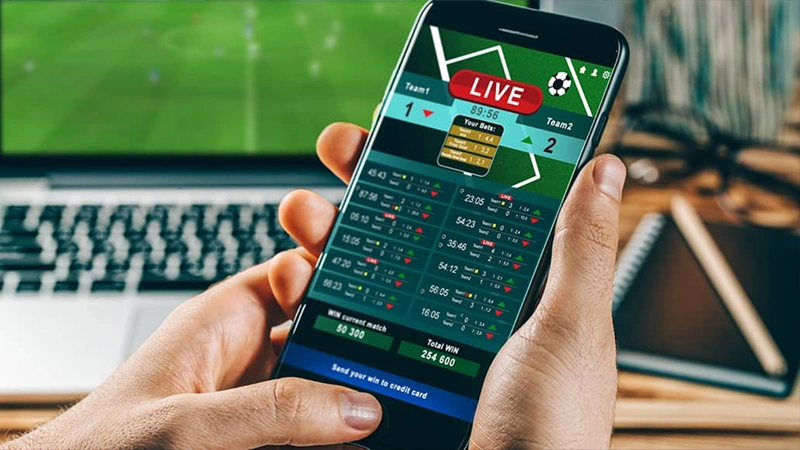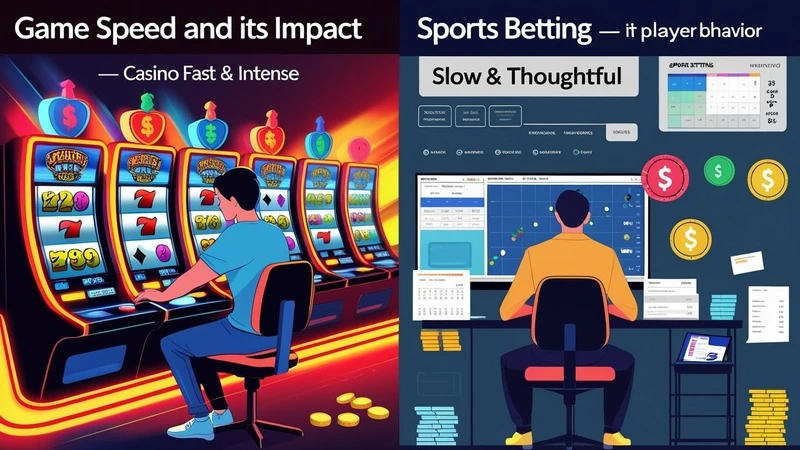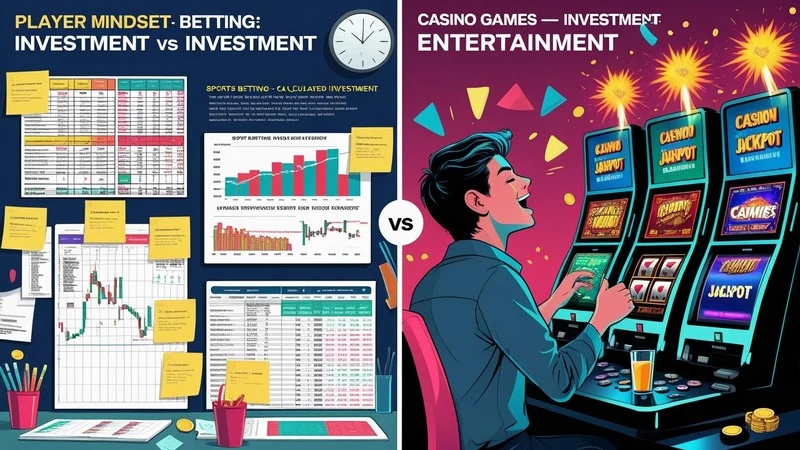Both sports betting and casino games offer excitement, potential rewards, and the thrill of putting your judgment (or luck) to the test. However, beneath their superficial similarities lies a fundamental difference in how they operate and how they affect player psychology. Understanding these differences is crucial for anyone who wants to engage with either form of entertainment responsibly.
The key to successful and safe participation in either sports betting or casino gaming lies in understanding the logic and psychology behind each format. This knowledge helps you choose the right approach, set appropriate expectations, and maintain control over your gaming experience.
This article provides an in-depth analysis of the strategic, control, and emotional differences between sports betting and casino games, helping you understand which might suit your personality and goals better, and how to approach each one safely.
Decision Making Logic: Data Analysis vs Pure Probability
Sports Betting – Based on Analysis, Knowledge & Prediction
Sports betting appeals to players who enjoy research and analysis. Before placing a bet, you can study team formations, recent performance trends, injury reports, historical matchups, weather conditions, and countless other factors that might influence the outcome. This wealth of available information creates a sense that skill and knowledge can improve your chances of success.

The odds in sports betting reflect real-world factors and public opinion, which means they can sometimes be “beaten” by superior analysis or information. Professional sports bettors exist precisely because it’s possible, though extremely difficult, to gain an edge through dedicated research and superior understanding of specific sports or markets.
This analytical component attracts players who prefer feeling that their success depends partly on their expertise rather than pure chance. The ability to “read the situation” and make informed predictions provides a different type of satisfaction compared to games of pure chance.
Casino Games – Based Entirely on RNG & Mathematical Probability
Casino games like slots, roulette, and baccarat operate on completely different principles.
These games use Random Number Generators (RNGs) that make outcomes entirely unpredictable and uninfluenceable. No amount of analysis, pattern recognition, or strategic thinking can change the fundamental odds built into these games.
Every spin, deal, or roll is independent of previous results, making it impossible to predict future outcomes based on past patterns. The house edge is mathematically fixed, and while short-term variance can create winning or losing streaks, the long-term results will always favor the casino by the predetermined percentage.
This fundamental difference means that casino games appeal to a different player psychology – those seeking pure excitement and willing to accept that outcomes are entirely beyond their control.
Psychological Control: Different Reactions to Wins and Losses
Sports Betting Losses Often Attributed to Poor Analysis
When sports bettors lose, they typically attribute their losses to factors within their perceived control: inadequate research, misreading team motivation, failing to account for a key injury, or misunderstanding weather impact. This attribution pattern can have both positive and negative psychological effects.

On the positive side, this mindset can help maintain emotional stability because losses feel explicable and potentially avoidable in the future. Players can maintain their confidence by viewing losses as learning experiences rather than random bad luck.
However, this can also lead to dangerous overconfidence, where players become convinced that they can “crack the code” and consistently beat the odds. This mentality can drive them to chase losses more aggressively, believing that better analysis will eventually lead to consistent profits.
Casino Games Rapid, Random Win/Loss Emotional Swings
Casino games create entirely different psychological dynamics. Since outcomes are random and immediate, players experience rapid emotional swings based purely on chance. The concept of “Knowing When to Stop” becomes crucial because there’s no logical endpoint built into the activity – no analysis to complete or strategy to perfect.
The psychological effects of near-misses are particularly powerful in casino games. When slot reels stop just one symbol away from a jackpot, players experience almost the same dopamine release as an actual win, encouraging continued play despite the loss.
This rapid cycle of hope, excitement, disappointment, and renewed hope can create addictive patterns more easily than sports betting because there’s no natural pause for analysis or reflection between decisions.
Game Speed and Its Impact on Player Behavior
Casino Games: Fast, Intense, Potentially Addictive
The speed of casino games is one of their most psychologically significant features. A slot machine spin takes seconds, a blackjack hand takes minutes, and roulette spins occur every few minutes. This rapid pace means players can experience dozens or hundreds of betting decisions per hour.

This high frequency of decisions creates several psychological risks. Players can quickly lose track of time and money spent, as the rapid succession of games blurs together. The fast pace also prevents the natural cooling-off periods that might allow for rational evaluation of wins and losses.
The combination of speed and randomness can induce a trance-like state where players become disconnected from their original intentions and limits. This is why casino games require particularly strong self-discipline and predetermined stopping points.
Sports Betting: Slower Pace, More Time for Consideration
Sports betting operates on an entirely different timeline. Games occur on scheduled dates, with gaps between events that provide natural opportunities for reflection and evaluation. This built-in pause system allows players to assess their recent performance, adjust their strategies, and make more considered decisions about future bets.
The slower pace makes it much more difficult to fall into the kind of continuous, compulsive betting patterns that can develop with casino games. Players typically have hours or days between betting opportunities, which provides natural circuit breakers against impulsive decision-making.
However, this doesn’t eliminate risk entirely. Some players compensate for the slower pace by betting on multiple simultaneous events or seeking out more frequent betting opportunities, which can recreate some of the problematic patterns associated with faster-paced gaming.
Player Mindset: Investment vs Entertainment
Sports Betting Often Viewed as “Calculated Investment”
Many sports bettors approach their activity with an investment mindset, viewing their bets as calculated risks based on superior knowledge or analysis. This perspective can lead to more systematic approaches, with detailed record-keeping, bankroll management, and strategic planning.
The investment mindset often creates stronger emotional attachment to specific sports or teams, which can be both beneficial and problematic. On one hand, it encourages deeper knowledge and more thoughtful decision-making. On the other hand, it can lead to biased thinking, where personal preferences override objective analysis.
Long-term sports bettors often develop sophisticated systems for tracking their performance, analyzing their strengths and weaknesses, and continuously refining their approach. This systematic mindset can support more responsible gambling behaviors.

Casino Games Focus on Quick Entertainment – High Risk, High Reward
Casino games typically attract players seeking immediate entertainment rather than long-term investment returns. The appeal lies in the possibility of instant, dramatic wins combined with the pure excitement of uncertainty.
This entertainment-focused mindset can be healthier in some ways, as players may be more willing to view their spending as an entertainment expense rather than an investment that should generate returns. However, it can also lead to less careful consideration of spending limits and less systematic tracking of wins and losses.
The “quick thrill” nature of casino games can make them particularly appealing during stressful periods, as they provide immediate distraction and the possibility of instant mood improvement through a big win. This emotional utility can make casino games more psychologically compelling than sports betting for some players.
Understanding to Choose Right – and Play Responsibly at Casino 91 Club
Both sports betting and casino games offer unique forms of entertainment, each with distinct appeals and risks. Sports betting attracts those who enjoy analysis, strategy, and the feeling that skill can influence outcomes. Casino games appeal to those seeking immediate excitement and the pure thrill of chance.
The key to enjoying either format safely lies in understanding the logic and psychological impact of each type of gaming. This understanding helps you set appropriate expectations, choose suitable games for your personality and goals, and maintain control over your gaming experience.
Casino 91 Club offers both sports betting and casino games with comprehensive tools for responsible gaming, including limit-setting features, transparent RTP displays, and guidance for safe play. Our platform is designed to enhance your entertainment while providing the safeguards necessary for responsible participation in either format.
Understanding the psychological differences between these gaming types helps you make informed decisions about which activities suit you best and how to approach them safely. Whether you prefer the analytical challenge of sports betting or the immediate excitement of casino games, knowledge and self-awareness are your best tools for maintaining control.
👉 Play for fun, understand for control – and choose the gaming style that fits you best.

